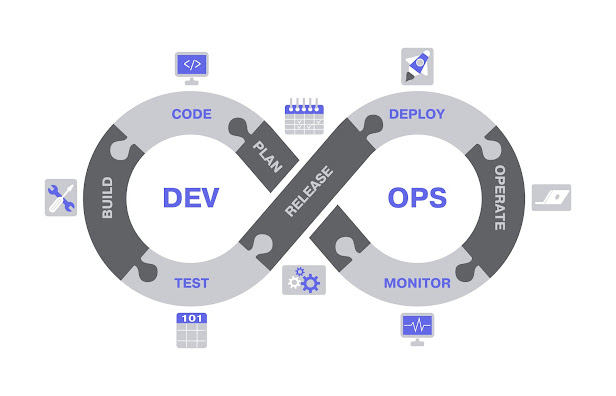DevOps Training: What it is and How to Become a DevOps Professional
What is DevOps?
DevOps is a practice that brings together
developers and operations teams so they can work together more collaboratively.
DevOps is about sharing information and processes between different roles so
everyone can do their jobs better. If your organization is practicing DevOps,
you’ll see that developers are talking to the operations team, who in turn are
working closely with the product owner and other stakeholders who may have
requirements for the product. The goal of DevOps is to increase quality,
accelerate delivery time, and minimize risk across the organization by
automating processes and creating a more collaborative environment between
different teams. DevOps is not just about developers writing code and
operations engineers deploying and managing the applications. It’s about
everyone working closely together to achieve the organization’s goals.
How is DevOps Different From Traditional Software
Development?
The term “software development” brings to
mind a specific image and set of activities within an organization. This can
include things like documentation, coding, and testing. Organizations that
follow a traditional software development model often employ many specialists
in different departments. In these organizations, the developers are
responsible for the coding and testing, while operations is responsible for
deploying and managing the applications after they’re built. In contrast, a DevOps Training in Noida
organization is more collaborative and interdisciplinary. Developers are often
responsible for testing their code, and operations is responsible for
deployment and management. These departments are much more fluid, with many
more people wearing multiple hats and constantly shifting between different
tasks.
Why Become a DevOps Professional?
When you work in a DevOps organization, you
will be expected to wear many different hats. In some organizations, you may
wear a different hat every day. This means you’ll have a lot of different
responsibilities and opportunities to learn new skills. This is one of the
reasons many people choose to specialize in the field of DevOps. If you’re
considering a career in the field, here are some of the most common roles you
may see in an organization. - Build Engineer - Build engineers are responsible
for creating the code that is deployed to production. In some organizations,
this will be done by a developer, while in others it’s done by a specialist
called a build engineer. - Deployment Engineer - Deployment engineers are
responsible for deploying the code once it’s been built. This includes making
sure the code is ready for deployment and carrying out the deployment in a way
that ensures its successful completion. - Release Engineer - Release engineers
are responsible for managing the deployment of code through the entire
production environment. - Site Reliability Engineer (SRE) - SREs are
responsible for managing the production systems that are in use. This includes
monitoring production systems and identifying any issues. SREs are often
responsible for choosing the tools used to monitor the production systems. -
Security Engineer - Security engineers are responsible for making sure the
production systems are secure. This may include managing security incidents,
managing the security of production systems, or auditing production systems for
security issues. - Security Operations Engineer (SOE) - SOEs are responsible
for operational security in production. This may include monitoring production
systems for security issues, responding to security incidents, or managing
security capabilities in the production environment. - Product Owner - Product
owners are responsible for managing the direction of the product from a
business perspective. This includes making sure the product is meeting the
needs of the customers and managing the product backlog. - QA Engineer - QA
engineers are responsible for testing the product before it’s put into
production. This includes creating test cases, writing code to test the
product, and executing and debugging tests to make sure the product is ready
for production. - Software Engineer - Software engineers are responsible for
writing the code for the product. This often includes working closely with
product owners and other stakeholders to define what should be built. - Site
Lead - Site leads are responsible for managing the operations of a production
environment. They may be responsible for managing all aspects of the
environment or managing specific areas, like production and disaster recovery.
How to Become a Professional in the Field of DevOps?
If you’re interested in pursuing a career
in DevOps, there are a few things you can do to get started. First, you’ll want
to understand the common terms you’re likely to encounter in the field and
learn more about the different roles. You may also want to try a few different
roles in the field to see where you feel most comfortable. You may even want to
consider attending a DevOps conference to meet people in the field and network
with others who are interested in the same career path as you. One of the best
ways to learn more about the field of DevOps is to read blog posts and articles
from people in the field. You can also consider joining a Slack or other online
communities where people in the field can connect and share their experiences.
You can also consider volunteering for an open source project. Volunteering for
an open source project will allow you to work with developers to deploy and
manage applications. You can also consider getting an internship at a company
where you can work in the field of DevOps.
Key Takeaway
DevOps is a practice that brings together
developers and operations teams so they can work together more collaboratively.
Ap2v
is a best option DevOps is to increase quality, accelerate delivery time, and
minimize risk across the organization by automating processes and creating a
more collaborative environment between different teams. If you’re interested in
pursuing a career in DevOps, you’ll want to understand the common terms you’re
likely to encounter in the field and learn more about the different roles. You
can also consider reading blog posts and articles from people in the field and
volunteering for an open source project to get a better feel for the career path.



Comments
Post a Comment